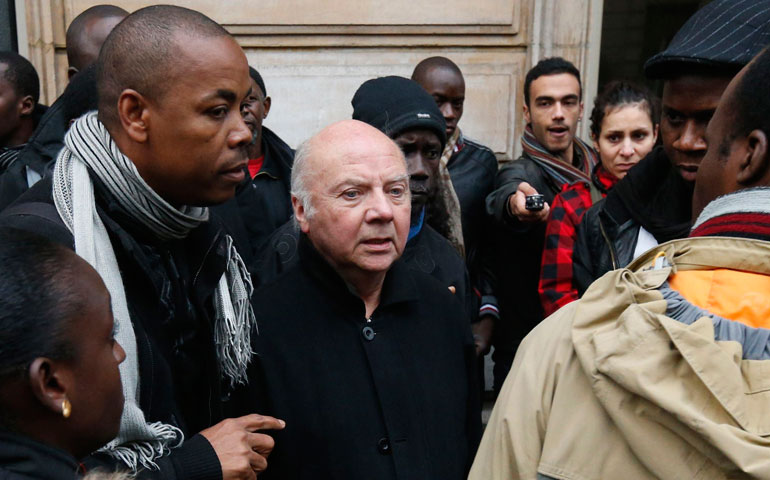
Bishop Jacques Gaillot speaks Jan. 3 with people in solidarity with hunger-striking illegal immigrant workers in Lille, France. (CNS/Reuters/Benoit Tessier)
Although recent portrayals of Benedict XVI play on his white-haired grandfatherliness and his desire to fade into a quiet retirement of books and music, many Catholics with long memories have images in their minds of "God's Rottweiler."
During his time at the Congregation for the Doctrine of the Faith (1981-2005), the office became one of the most controversial Vatican agencies. He decried secularization, liberation theology, radical feminism, homosexuality, religious pluralism and bioethics.
Numerous Catholics found themselves in hot ecclesial water: Fr. Hans Küng; Jesuit Fr. Karl Rahner; Seattle Archbishop Raymond Hunthausen; Leonardo Boff; Fr. Charles Curran; Fr. Tissa Balasuriya; Jesuit Fr. Roger Haight; Fr. Matthew Fox; Loretto Sr. Jeannine Gramick and Salvatorian Fr. Robert Nugent; Dominican Fr. Gustavo Gutiérrez; and Jesuit Fr. Jacques Dupuis, among others.
Cardinal Joseph Ratzinger, a former theology professor and bishop of Munich, was 54 years old when he was named to head the doctrinal congregation, the office charged with upholding orthodoxy.
He criticized the overreach of bishops' conferences. At the time the American bishops issued their pastoral letter in 1983 on war and peace, Ratzinger was arguing that episcopal conferences have no standing to teach on doctrinal issues. He criticized the International Commission on English in the Liturgy -- comprising representatives of the major English-speaking bishops' conferences -- on its approach to translation.
His first few years as head of the congregation dealt much with liberation theology, a movement centered on the poor and one that Ratzinger believed had ties to Marxism. In 1985, the Vatican silenced the Brazilian Boff, at the time a Franciscan priest and scholar of liberation theology. Ratzinger found Boff's 1981 book Church, Charism and Power troubling in its declarations on Christology and the structure of the church.
Often called the "father of liberation theology," Peruvian Dominican Gutiérrez faced several Vatican investigations in the 1980s for his writings.
Besides liberation theology, writings on sexual ethics became a hot topic. In 1983, Hunthausen, a well-known progressive bishop, allowed a Mass for Dignity, a group for gay and lesbian Catholics, in his cathedral, which resulted in complaints to the doctrinal congregation.
The congregation then asked Washington Archbishop James Hickey to make an official Vatican visitation. Hickey found "a number of other basic doctrinal problems" in the archdiocese. In 1985, the congregation appointed as auxiliary bishop Fr. Donald Wuerl (now cardinal-archbishop of Washington, D.C.), a Pittsburgh priest with long experience in Rome. In September 1986, Hunthausen announced he had transferred final authority in five areas to Wuerl in accord with Vatican instructions.
A month later, Ratzinger published "On the Pastoral Care of Homosexual Persons." The document warns of "deceitful propaganda" from pro-homosexual groups and instructs bishops not to accept groups that "seek to undermine the teaching of the church, which are ambiguous about it, or which neglect it entirely." The letter refers to homosexual orientation as an "intrinsic moral evil."
Curran, a moral theologian who led the American resistance to Humanae Vitae in the late 1960s, was investigated by the congregation for his teachings on sexual ethics and fired from his teaching position at The Catholic University of America in Washington, D.C., in January 1987.
Bishop Jacques Gaillot was removed as bishop of Evreux, France, in January 1995 after he publicly challenged church teaching on several issues, among them contraception, priestly celibacy, homosexuality and the use of condoms in AIDS prevention programs. Tens of thousands of French Catholics protested his firing. But the Vatican did not relent, saying he was not in communion with the church. Gaillot was given the titular diocese of Partenia, which no longer exists as a territorial see.
In July 1999, after close to three decades of service to the gay and lesbian community in the U.S., Gramick (then a School Sister of Notre Dame) and Nugent were barred from ministry to the gay and lesbian community by the congregation for not representing authentic church teaching on homosexuality.
As different religions of the world acknowledged others, religious pluralism became an issue. Ratzinger once called religious pluralism theology the gravest threat of the church.
In January 1997, Sri Lankan theologian Balasuriya was excommunicated (a penalty that was later lifted) after being accused of theological aberrations, including assertions that Christianity is on the same level as other religions.
In 1998, the Vatican criticized the book Toward a Christian Theology of Religious Pluralism by Dupuis, a Belgian. After three years of investigation, in 2001 the Vatican backed away from its initial finding of "serious doctrinal error" in the book but said there were "ambiguities and difficulties on important points which could lead a reader to erroneous or harmful opinions."
In September 2000, the congregation released the document Dominus Iesus, which emphatically denied that other world religions can offer salvation independent of Christianity.
Many saw the document as clamping down on theological speculation on religious pluralism, or creating a chilling effect for interreligious dialogue.
After many years of investigation, the Vatican banned Haight from teaching and publishing in 2008 because of his 1999 book Jesus: Symbol of God. In it, the American Jesuit argued that other world religions can offer pathways to God alongside Christianity.
[Zoe Ryan, NCR staff writer, compiled this report from the NCR archives.]



